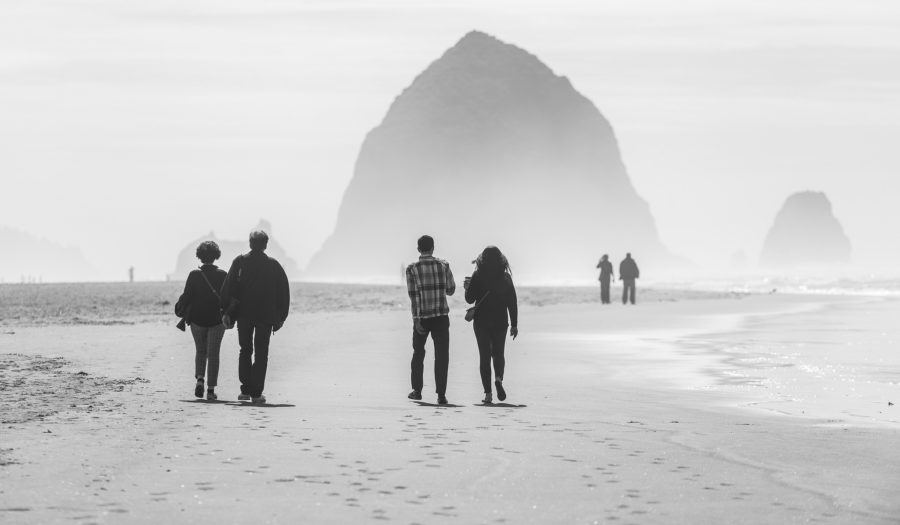Eric
Among the Northwest’s living treasures is surely Floyd McKay. I’ve had the great pleasure of talking with him on a number of occasions over the last several years as he covered the coal exports and oil train controversies that have wracked the region. And I’m delighted to note that he’s published a new book, Reporting the Oregon Story: How Activists and Visionaries Transformed a State, that is part autobiography and part argument that Oregon began the modern environmental movement in the Northwest. As he explained to me in an email:
The major elements of The Oregon Story began in 1965, only three years after Rachel Carson’s Silent Spring opened new fronts on the environmental field nationally. In two short decades, Oregon amassed a series of groundbreaking accomplishments that put it at the forefront of the emerging movement.
Included on that list would be preserving beaches for public access and preventing any roads on them; cleanup of the Willamette River and preservation of scenic rivers and streams; the strongest land-use laws in the nation; the foundation for the Portland renaissance that transformed a rather conventional small city into a major national magnet for talented and freethinking people; the “Bottle Bill” that pioneered recycling; preservation of the Columbia Gorge as a national scenic area; and others.
It was an era of transformative political figures, none more so than Gov. Tom McCall, a former broadcaster who championed the changes and backed the nation’s first and only state-sponsored rock festival to divert youth from potentially violent protests in 1970. It was the time of Sen. Wayne Morse and his courageous opposition to the Vietnam War, and Sen. Mark Hatfield, an equally forceful war opponent and co-sponsor of the McGovern-Hatfield bill to end the war.
The era was also the high point of local television in the region, led by King Broadcasting in Seattle and Portland. I was in the midst of that, moving from print to television in 1970, and I saw it all as reporter and commentator. KGW-TV, the King station in Portland, was the leader; McCall was a former commentator at KGW and I followed in that role.
Here’s an interview with Floyd about the genesis of his book.
I’m not exactly a huge fan of coal baron Robert Murray, but you’ve got to admit that the guy is highly quotable. This week, in an interview with an industry publication he perfectly summed up the economic merits of the Northwest coal export proposals: “The folks that were wanting to build ports to export PRB coal on the West Coast — that was smoking opium.”
Finally, I thought this was a trenchant analysis: “Enough Is Enough. It’s Time For Our Politicians To Ask The NRA For Permission To Enact Modest Gun Control Measures.”
John
In her latest book, This Changes Everything, award-winning author Naomi Klein devotes a full chapter to “Blockadia” to describe the opposition across the world of organized citizens to new fossil fuel projects because those projects can worsen climate change and have negative impacts on communities nearby. As she explained in a 2014 interview, citizens organized to oppose the Keystone XL pipeline first coined the term to describe their own camps in Texas, but she also reports how the Pacific Northwest figures prominently in this phenomenon in what Sightline has begun to call “the thin green line.” In Idaho, for example, tribes and environmental organizations protested and temporarily halted highway movement of a “megaload” of heavy equipment on its way to extract the tar sands.
Klein notes that the rapacity of fossil fuel companies has led them to search for ever-more dirty and difficult-to-extract energy sources, and to sell them before governments wake up to citizens who want to fight climate change and “keep it in the ground.” As result of its expanded efforts, the industry is beginning to threaten locations previously removed from “sacrifice zones” resulting from extraction. Direct impacts now threaten communities such as those whose water might be contaminated by fracking, those whose land and properties might be damaged by proposed pipelines to refineries for export, and those near the routes of coal trains or oil “bomb” trains.
She profiles the Lummi Nation, fighting a coal export terminal, whose members carried a “healing” totem pole to sites in the West. This action expressed solidarity with the Northern Cheyenne and ranchers fighting the proposed Otter Creek mine in Montana, which would have exported coal via a Northwest port. The Lummis have also carried the totem pole to locations in Canada to oppose tar sands extraction. As a Canadian with relatives in British Columbia, Klein is especially concerned about her government’s decision to allow oil companies to exploit the Alberta tar sands and send fuel west to the Pacific via proposed pipelines.
A documentary movie of the same name depicts some of the efforts worldwide to fight the fossil fuel industry. This preview includes images of tar sands extraction, and Northwest “kayaktavists,” along with other organized citizens who have become part of Blockadia worldwide.
Deric
Bill Rees, co-founder of the ecological footprint and Vancouver resident, gave an impassioned speech titled “Getting Serious About Urban Sustainability” at the Sustainable Consumption Research and Action Initiative conference I participated in this week. He demonstrated the need to rethink our assumptions about urban sustainability based on empirical resource trends and constraints. He calls for solutions for an urban form, based on regional economies that, by necessity, will look very different than what we see today.
Also at the conference, Vanessa Timmer, executive director of Vancouver’s OneEarth, and Babe O’Sullivan, former sustainability liaison for the City of Eugene, presented a new Sustainable Consumption Toolkit built for the Urban Sustainability Director’s Network. The toolkit identifies solutions for absolute reductions in the material goods and energy by helping cities think about and act on consuming differently.
John Abbotts is a former Sightline research consultant and Deric Gruen is a Sightline Fellow; both occasionally submit material to Weekend Reading.

